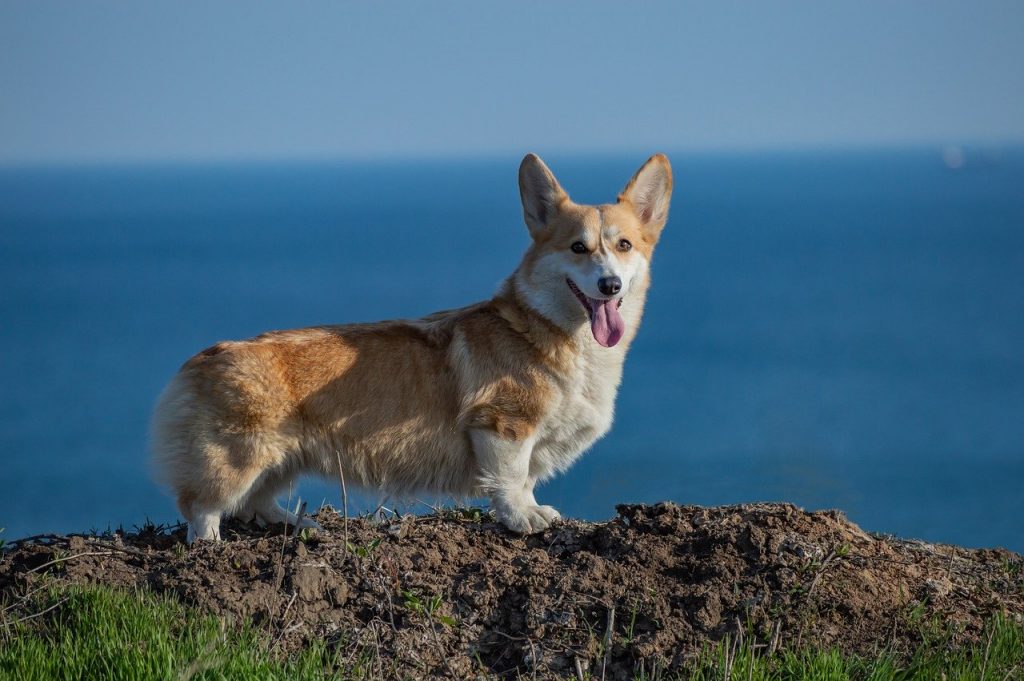Overview
Group: Herding Group
AKC Breed Popularity Rank: No. 13 of 195
Height: 10-12 inches
Weight: Male – Up to 30 lbs; Female – Up to 28 lbs
Life Span: 12-13 years
Temperament: Loving and Affectionate; Alert; Intelligent
Although the Pembroke Welsh Corgi has become a prized house pet, this diminutive – and adorable – dog has humble working-class roots. And it shows in its intelligence, athleticism, and devoted companionship. Indeed, this littlest member of the herding group has come a long way and has emerged as the dog of choice of English nobility.
History
In 1107, Henry I of Britain invited master weavers from Flanders, Belgium to immigrate to Southwest Wales in order to spruce up his royal wardrobe. These weavers accepted his invitation and brought with them their little herding dogs to watch over their sheep and cattle. These dogs were the ancestors of the Pembroke Welsh Corgi.
While the Pembroke is a separate breed of dog from the Cardigan Welsh Corgi, some crossbreeding has occurred between the two breeds in Pembrokeshire and Cardiganshire, the leading breeding centers of Wales.
To differentiate between the two, the Pembroke has pointed, erect ears and shorter tail while the Cardigan has rounded ears and longer tail.
The world’s most famous Pembroke lover is none other than Queen Elizabeth II.
In the course of her reign, the Queen owned more than 30 corgis, the last being Willow who had to be put down after suffering from cancer.
General Appearance
The Pembroke Welsh Corgi is a low set dog with sturdy build, giving the impression of stamina and substance within a small body. It has a proud and bold look, and yet its eyes reveal its kindness and friendliness. Its medium length coat consists of a long and coarse outer coat and a shorter, thick, and weather-resistant undercoat. Standard coat colors include sable, red, fawn, tan, and black, with or without white markings. Its deep chest and short, muscular thighs and legs define its herding roots.
In temperament, the Pembroke alert, energetic, and affectionate without being too needy.
Nutrition
Ideally, Pembrokes should be given a diet that is freshly prepared and not regular dog food. You may prepare them meats like beef and rabbit, and some vegetables like potatoes, cabbage, and fish. If it is not possible to prepare meals for them, ask your veterinarian what dog food you can give.
While treats are great training aids, give them in moderation to prevent your dog from getting overweight or obese.
Grooming
The Pembroke is a moderate shedder so it needs to be brushed on a daily basis with a comb and slicker brush. During the heavy shedding seasons of spring and summer, brushing should be done more frequently. Bathing can help loosen dead hairs which can be brushed away with a rake. The ears should also be cleaned and inspected regularly. Keep its nails trimmed so it won’t cause pain when your dog runs.
Exercise
Pembrokes love going out on walks or jogs. However, because of their short legs, set a pace so that they can follow you. Let them play in a fenced yard. To let it indulge in its herding instincts, have your Pembroke play with family members and children or, if you live on a farm, let them do some farm work. Or you can have them participate in canine sports, such as obedience, herding, tracking, and agility.
Pembrokes do not do well in temperature extremes. Always make sure to have clean, fresh water available for your dog.
Training
As early as puppyhood, your Pembroke needs to undergo training and socialization. While their intelligence and eager-to-please attitude makes them easy to train, they easily get bored with repetitive training. Instead, gradually expose them to a variety of people, places, and situations. Nipping ankles is part of their herding tendencies and should be controlled at an early age.
Health
Although Pembrokes are healthy dogs, they are prone to certain diseases, such as hip dysplasia and herniated discs, eye problems like cataracts and retinal dysplasia, epilepsy, and von Willebrand’s disease. Bring your dog to the veterinarian for regular checks. Also, keep your Pembroke’s ears clean to prevent infection.
Costs
Pembroke puppies, on average, cost $800, but the price range can shoot up from $1,700 to $10,000 for pups from championship lines. During the first year, upkeep costs are between $500 and $2,000. In the succeeding years, upkeep costs drop to $1,000 per year.
It cannot be denied that the Pembroke Welsh Corgi, with its sweet, adorable looks, is a must have pet among dog lovers. While you cannot ask for a more loyal and devoted dog, it is important to ensure that your Pembroke gets the activity it needs to keep it healthy and its herding instincts alive.
SOURCES:
1) Pembroke Welsh Corgi https://www.akc.org/dog-breeds/pembroke-welsh-corgi/
2) The Queen’s corgis are dead: long live the ‘dorgis’ https://www.theguardian.com/uk-news/2018/apr/18/the-queens-corgis-are-dead-long-live-the-dorgis
3) Best Diet for Adult Corgi http://corgiguide.com/best-diet-corgi-adult/
4) The Diet for a Welsh Corgi https://pets.thenest.com/diet-welsh-corgi-6534.html
5) Pembroke Welsh Corgi Puppies for Sale https://www.nextdaypets.com/Welsh-Corgi-Pembroke.htm


